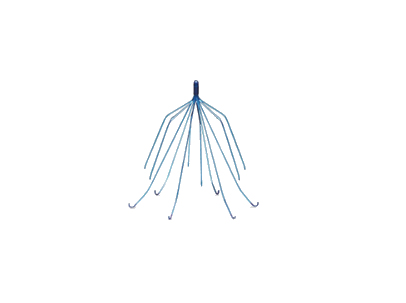On-Demand Degradable Medical Devices Rambam
Dr. Yaron Bar Lavie, Division of Critical Care Medicine
Dr. Amos Ofer, Department of Medical Imaging
The Hebrew University of Jerusalem
Prof. Oded Shoseyov, Prof. Danny Porath, Dr. Ofra Benny

Background and Medical Problem
There is an acute need for implantable vascular medical devices that can be degraded on-demand when they are no longer required.
Implantable devices are used extensively in medicine. Some are permanent and others have to be removed, either surgically or through a minimally invasive endovascular surgery device. A few are degradable but none are degradable on-demand. Often, the device is only needed for a short period and, in the long run, may interfere with normal endothelial functions. The ideal device would dissolve completely after a few weeks or months.
An IVC filter is an example of a much needed degradable, on-demand, medical device. It is implanted in the inferior vena cava to prevent life-threatening pulmonary emboli.
It is estimated that annually in the U.S.A., 250,000 filters are used, with another 250,000 used worldwide – half of this amount for prophylactic indications.
Innovative Solution
The aim of this project is to develop a biocompatible thermo-responsive polymeric film with mechanical and thermal properties suitable for electromagnetic-triggered dissolution. The project is based on the realization that, at times, it is preferable to have a medical device that degrades on-demand (for example, by application of an external energy source such as radio frequency). This medical device will be placed inside the body for a time period that does not have to be determined in advance. When desired, the external energy source will be applied and the device, or part of the device, will degrade.
Current Status
Initial experiments with the polymers show that polymer can be dissolved. Polymer design and optimization is ongoing.
About the Inventors
This project is led by a multidisciplinary group of physicians and scientists who are leaders in their respective fields.
The Rambam Team
Yaron Bar Lavie, MD
Dr. Yaron Bar Lavie is Chair of Rambam's Division of Critical Care Medicine and Director of the Department of Critical Care Medicine. Dr. Bar Lavie was previously the director of our Intermediate Intensive Care Unit and director of the Neurosurgical Intensive Care Unit. Bar Lavie was also an attending physician in critical care medicine at the Shock-Trauma Center at the University of Maryland Medical System in Baltimore, Maryland. He received his MD in 1987 from Ben-Gurion University of the Negev, Beersheba, Israel.
Amos Ofer, MD
Dr. Ofer is Director of the Interventional Radiology Unit in the Department of Medical Imaging at Rambam. He is a graduate of the Sackler School of Medicine at Tel Aviv University. After completing his radiology residency at Tel Hashomer Hospital in 1995, Dr. Ofer joined Rambam’s staff in 1996. After completing fellowships at both the Interventional Unit at Thomas Jefferson University in Philadelphia and the Department of Radiology at Harvard’s Beth Israel Deaconess Medical Center in Boston, Dr. Ofer was appointed Director of Rambam’s Interventional Radiology Unit in 2001. Dr. Ofer's main interests include endovascular treatments in the thoraco-abdominal aorta, advanced oncology procedures such as chemo-embolization of primary liver tumors including hepatocellular carcinoma, and selective internal radiation treatment (SIRT) for liver colorectal metastasis.
The Hebrew University Team
Prof. Oded Shoseyov
A faculty member of the Hebrew University of Jerusalem, Prof. Shoseyov’s research focuses on plant molecular biology protein engineering and nano-biotechnology, specifically, bio-inspired nanocomposite materials. He has authored or co-authored more than 160 scientific publications and is the holder or coholder of 45 patents. Prof. Shoseyov received the Outstanding Scientist Polak Award for 2002, the 1999 and 2010 Kay Award for Innovative and Applied Research, and the 2012 Israel Prime Minister Citation for Entrepreneurship and Innovation. He is the scientific founder of nine companies.
Prof. Danny Porath
Prof. Porath is the Etta and Paul Schankerman Chair of Molecular Biomedicine, Institute of Chemistry, and member (outgoing director) of the Harvey M. Kreuger Family Center for Nanoscience and Nanotechnology. His research includes biotemplated systems for nano-electronics and nanotechnology applications.
Dr. Ofra Benny
Dr. Benny is a faculty member at the Institute of Drug Research, Faculty of Medicine, School of Pharmacy. She investigates the mechanisms involved in angiogenesis and factors causing resistance to anti-angiogenic therapies and developing nanoparticles with improved cancer-targeting abilities and enhanced uptake.

